Outdoor basketball courts are a great way to enjoy the game of basketball while also getting some fresh air and exercise. However, not all surfaces are created equal. The best outdoor basketball court surfaces for backyard courts are those that provide a good balance of durability, traction, and ball responsiveness. Some popular options include asphalt, concrete, and modular tile surfaces.
In this article, we will discuss the best outdoor basketball court surfaces for backyard courts.
Concrete surface:
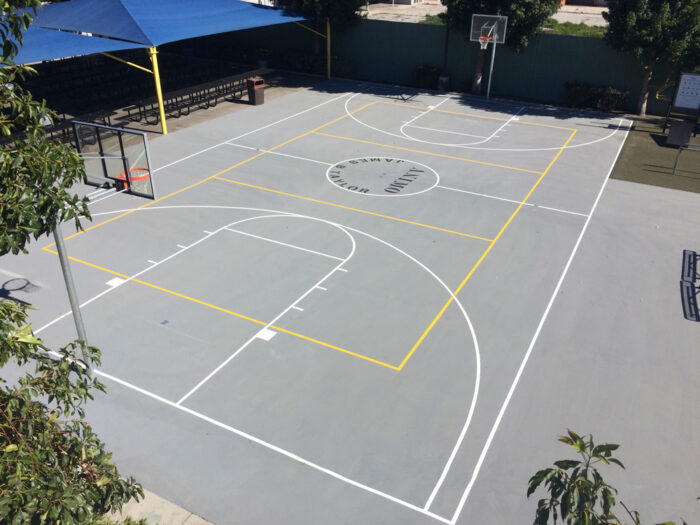
Source: sportsurf.co
The first type of surface to consider is a concrete surface. Concrete is one of the most popular choices for backyard basketball courts because it is durable, easy to maintain, and inexpensive. Additionally, concrete can be painted or stained to create various color schemes, allowing you to customize the look of your court. However, one of the major drawbacks of concrete is that it can be very hard and unforgiving, leading to increased wear and tear on the players’ joints and can also increase the risk of injury.
Asphalt
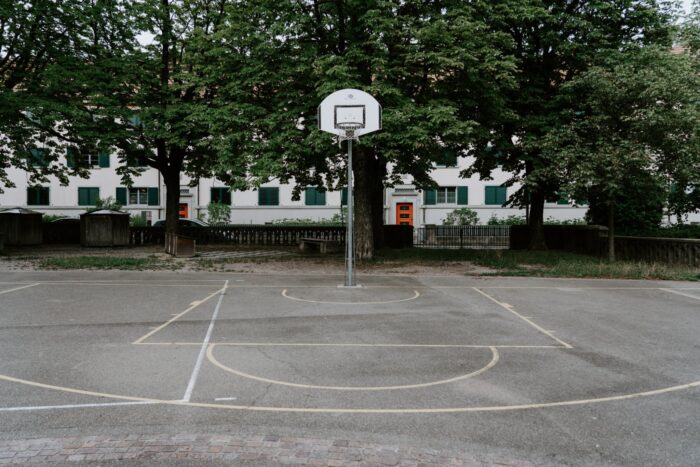
Source: asphalt.com.au
Another popular option for backyard basketball courts is asphalt. Asphalt is known for its durability and low maintenance requirements, making it a great option for those who don’t want to spend much time maintaining their court. Additionally, asphalt courts can be painted or coated to give them various looks. However, like concrete, asphalt can be very hard and unforgiving and can also become very hot in the summer months, making it uncomfortable for players.
Before going to the steps, check out CopoSports outdoor basketball court flooring solutions.
Rubber surface
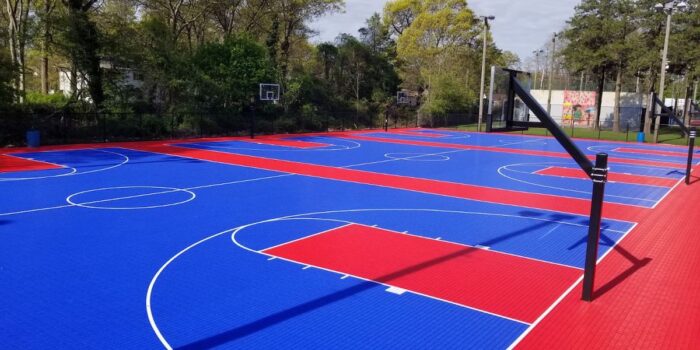
Source: goatturf.com
A third option for backyard basketball courts is a rubber surface. Rubber surfaces are known for their shock-absorbency, which can greatly reduce the risk of injury for players. Additionally, rubber surfaces are often made from recycled materials, making them an eco-friendly choice. However, rubber surfaces can be expensive and can require frequent maintenance, such as sweeping and resealing.
Sport tile surfaces
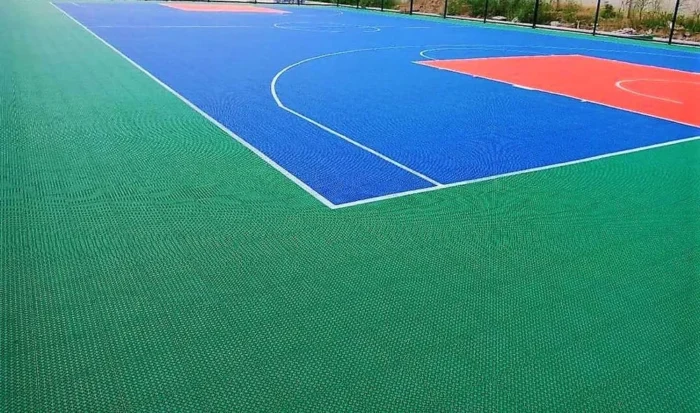
Source: indiamart.com
A newer option that has been gaining in popularity is the sport tile surfaces. These tiles are made from high-impact polypropylene that is UV resistant and long-lasting. they are also slip-resistant and are ideal for both indoor and outdoor use. They are easy to install and can be a DIY project. One of the main benefits of sports tiles is that they provide excellent traction and ball control, which can improve the overall playability of the court. They also come in various colors and can be used to create custom designs.
Synthetic Turf Surface
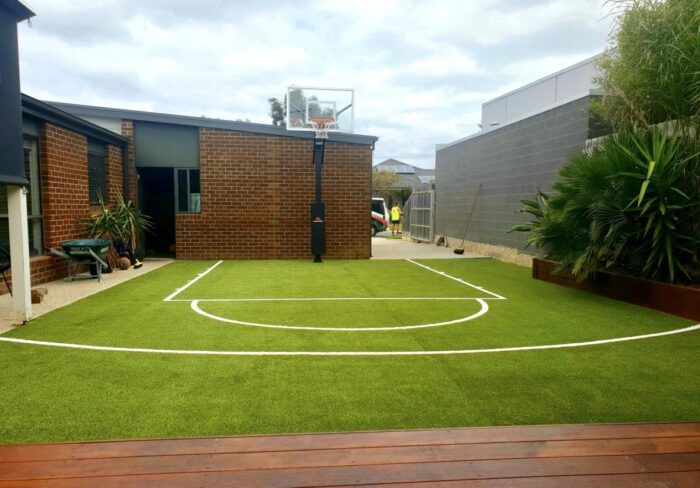
Source: grassrootssl.com.au
A final option to consider is a synthetic turf surface. Synthetic turf surfaces are becoming increasingly popular for backyard basketball courts because they are low maintenance, durable, and can provide a playing surface that is similar to natural grass. Additionally, synthetic turf surfaces are often made from recycled materials and are an eco-friendly option. However, synthetic turf can be expensive and can also become very hot in the summer months, making it uncomfortable for players.
What is better for a basketball court, concrete or asphalt?
Asphalt and concrete are the two most commonly used materials for basketball court surface.
Asphalt is the most widely used surface material for outdoor basketball courts due to its accessibility and ease of installation. However, it can deteriorate over time and develop small cracks and chips.
Concrete is known for its smoothness, durability, and consistency. However, since it is difficult to work with due to its hardness, it requires a layer of rubber to be added between the concrete foundation and the acrylic surface in order to absorb shock and make it more player-friendly.
How thick should asphalt be for a basketball court?
Asphalt for a basketball court should typically be between 2.5 and 4 inches thick.
What are the considerations when choosing outdoor basketball surface?
The first factor to consider is the type of play you are looking for. Different types of surfaces are designed for different levels of play, from casual pick-up games to professional competitions.
For example, suppose you are looking for a surface that can accommodate high-level, competitive play. In that case, you may want to consider a concrete or asphalt surface known for its durability and playability. However, suppose you are looking for a more suitable surface for casual, recreational play. In that case, a copo sports Macwood Surface is a better option, as they offer more shock-absorbency and reduce the risk of injury.
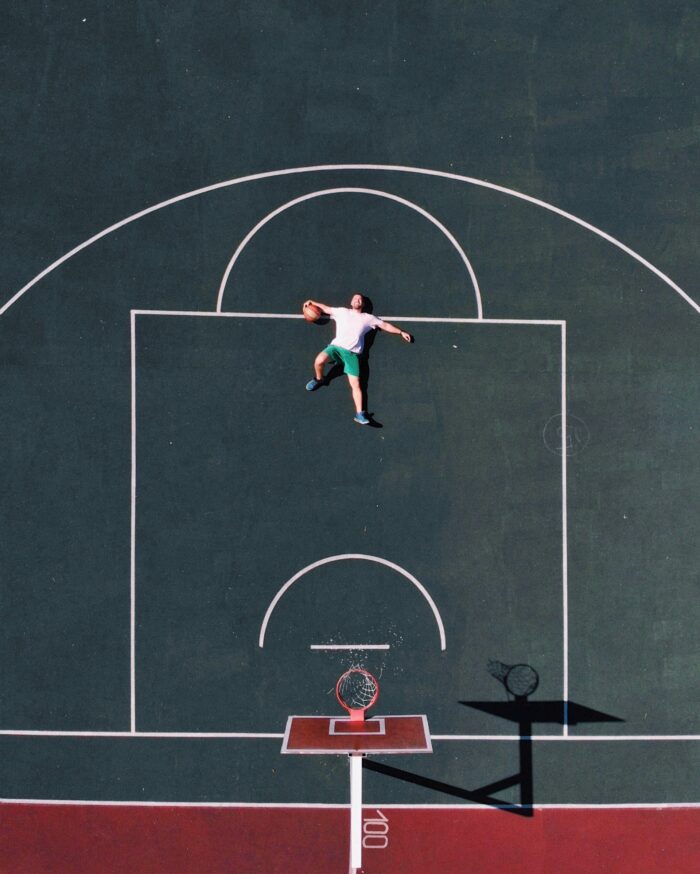
Source: unsplash.com
How do I make my outdoor basketball court less slippery?
To make an outdoor basketball court less slippery, use slip-resistant additives in the asphalt or concrete mix, apply sealcoat, use anti-slip paint or tape, keep the court clean and dry, maintain the surface by filling any cracks and holes, and sweep the court surface before playing to remove debris.
Does a basketball court add value to a home?
A basketball court can add value to a home by providing a unique and desirable feature for potential buyers and providing a space for entertainment and recreation for residents. It can also increase your property’s value depending on the court’s design, location, and maintenance.
What are the 2 sizes of basketball courts?
The size of basketball courts can vary. According to the National Basketball Association (NBA) regulations, the court measures 94 feet by 50 feet (28.7 meters by 15.2 meters). However, under International Basketball Federation (FIBA) regulations, the court is slightly smaller, measuring 28 meters by 15 meters (91.9 feet by 49.2 feet).
Final Words
In summary, building a backyard basketball court is a great way to improve your play and to provide you and your family with a fun and exciting outdoor activity.
When choosing the surface of your court, it is important to consider factors such as cost, maintenance requirements, and the type of play you are looking for. Concrete, asphalt, rubber, sport tile, and synthetic turf surfaces are all great options for backyard basketball courts, and each has its own drawbacks as well.
